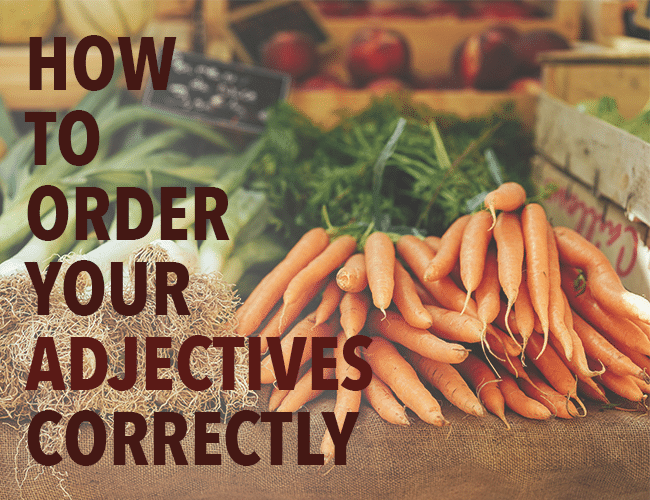Do you like delicious, large, fresh, round, red apples? Or do you prefer crunchy, long, orange, locally grown carrots?

Whatever your produce preferences, I bet you don’t like red, large, delicious, fresh, round apples or locally grown, orange, long, crunchy carrots.
Let's take a look at the correct way to order adjectives (and yes, there is a correct way).
The Tricky Order of Adjectives
If you’re confused about this, you’re not alone. J. R. R. Tolkien ran into this little-known quirk of English grammar when he first began writing:
I first tried to write a story when I was about seven. It was about a dragon. . . . My mother said nothing about the dragon, but pointed out that one could not say “a green great dragon,” but had to say “a great green dragon.” I wondered why, and still do.
—J. R. R. Tolkien, The Letters of J. R. R. Tolkien
“Green great dragon” sounds as strange as “Greek, fat, big wedding.” Neither one works quite right. But why not?
Recently, this peculiarity of English grammar took Twitter and then NPR by storm when BBC culture editor Matthew Anderson tweeted an excerpt from The Elements of Eloquence: How to Turn the Perfect English Phrase by Mark Forsyth:
[Adjectives] in English absolutely have to be in this order: opinion-size-age-shape-colour-origin-material-purpose Noun. So you can have a lovely little old rectangular green French silver whittling knife. But if you mess with that word order in the slightest you’ll sound like a maniac. It’s an odd thing that every English speaker uses that list, but almost none of us could write it out. And as size comes before colour, green great dragons can’t exist.
Remember Your Adjective Order
If you’re a native English speaker, you probably order your adjectives correctly without even thinking about it. This is a rule you didn't know you knew.
For non-native speakers, though, this rule can be a tricky sticking point.
It’s an obscure, seemingly insignificant rule. But as Forsyth points out, “green, great dragons can’t exist,” and neither can Greek, fat, big weddings.
Perhaps you like to use fancy, long, old adjectives, or maybe you prefer common, short ones. The real question is, are they in the proper order?
Were you familiar with this grammar rule? Do you have a handy way to remember it? Let me know in the comments.
PRACTICE
How many adjectives can you use at once? Take fifteen minutes to write a story about making dinner using as many adjectives as you can cram in. Make sure to put them all in the proper order!
When you’re done, share your writing in the comments below, and don’t forget to leave feedback for your fellow writers.
Alice Sudlow is the Editor-in-Chief of The Write Practice and a Story Grid certified developmental editor. Her specialty is in crafting transformative character arcs in young adult novels. She also has a keen eye for comma splices, misplaced hyphens, and well-turned sentences, and is known for her eagle-eyed copywriter skills. Get her free guide to how to edit your novel at alicesudlow.com.



Wow, that is something I’ve never even thought about. I’ve always taken the do whatever feels best approach, so count me as surprised that there is an actual formula to it.
I’m with you there, Jason. I don’t think I ever actually thought about it. I just usually write whatever sounds the best… But I suppose, being a native English speaker, it comes naturally to me to do it correctly. I’ll have to keep this rule tucked away, though for future reference.
Sure: Op, Si, A, Sh, C, Or, M, P,Noun. Lol. I’m not that surprised there was an order. I seem to remember learning the same concept in my little high school Spanish Class. Ha! So would that break down as: Little (size) high school (purpose) Spanish (purpose) Class (noun)?
a very useful rule!